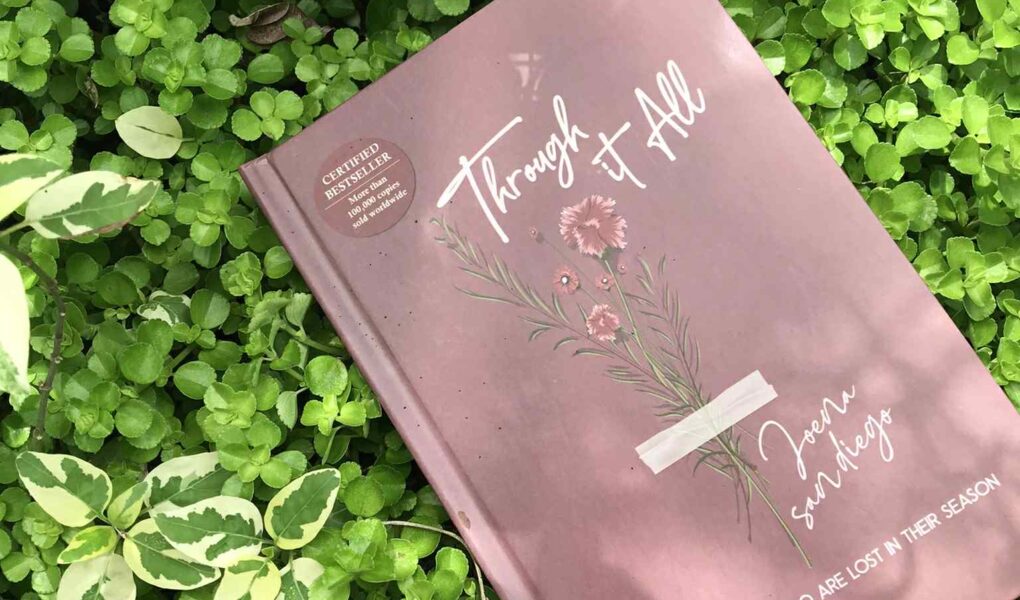[Trigger warning: This book review has heavy emotional tones.]
Emotional overload it is.
Things can get so overwhelming that you wouldn’t even notice it, but you’d just be surprised at how these suddenly disrupt you, eventually causing you to crash out, no matter how hard you avoid this happening.
This became timely for me. I’ve had a lot of crash-out episodes and these have been taking a toll on me holistically. Coincidentally (and ironically), I was reading this book throughout. How thoughts were written here seems easy to digest yet reality hits me: it’s insurmountable to deal with emotional baggage. But I’m glad I chose to buy this book and read it anyway.
“Through It All” is a book that tackles the journey of forgiveness, healing, and surrender. Admittedly, these three aspects of living are among the most difficult ones to attain for many reasons. In my case, it is pride. Being in a fight-or-flight mode for so long has caused me to always put my guard up at almost anything towards anyone. Like, I don’t want to be seen as someone giving easy access to people.
Prior to reading the book, I’ve somehow learned about the beauty and humility of surrendering. I’ve been doing my best to emulate this in almost everything I do, but there would be instances that this pride would seep in and I’d end up self-sabotaging. I won’t deny this part; some parts of my current grind are rage-fueled. Who exactly am I angry at? Myself. I keep on raising bars too high that I am losing myself in the process and failing to appreciate the beauty of this exact journey I’m going through.
I guess that’s why I’ve always been compelled to read this book. I bought this a few months back but I never had time to read it and it has been sitting on my desk since then. But I knew I had to, one day. It’s like my system subconsciously knows exactly what it needs as I continuously pursue recovery from everything.
This book review will be more of self-reflection, really. And probably the most emotional one I’ll be writing yet.
How Forgiveness Is Depicted
In most cases, forgiveness is seen as a weakness and a form of defeat. Some also perceive this as something that should be given immediately, dismissing the process and pain of healing one’s wound. Pretty much the reason why this word is too heavy to even comprehend.
Little did most realize, being able to forgive is a power move. Like, a transformative release. Instead of holding on to pain and grudges, forgiveness allows us to be free and restart in many domains. You know, as if a heavy burden’s lifted and you don’t have to be suffocated by the hurt.
There shouldn’t be shame in forgiveness. It’s a gift. Something that we can choose to do.
Surrender As a Form of Quiet Trust
There’s humility in surrender, and it’s one of the most beautiful forms of strength one can feel. Acknowledging one’s limits in doing things is important and we all have to accept that not everything is within our control.
The concept of stoicism is applicable here, yet it’s difficult to perfectly execute when there’s no surrender.
Whether it be something we can’t immediately achieve, something we aren’t certain about, or someone we truly love, surrendering them to the One who knows best is a form of trust that all these will work out, and perhaps a form of love we can show to someone, knowing that He’ll always get ahold of this person’s heart, mind, and soul.
When Pain Becomes Teacher
Reading Through It All made me sit with things I’ve long tried to suppress: a combination of frustrations such as pain, sadness, unmet expectations, and the weight of pretending I’m fine when I’m not. I realized how often I mask exhaustion with productivity and heartbreak with performance. Somewhere along the way, I equated strength with perfection and healing with hiding. But the cracks kept showing, and the breaking kept happening.
The book didn’t give me answers. But it held space. It reminded me that I don’t have to keep running on empty to feel worthy. That pain, when met with compassion and grace, can be a set of lessons to unpack, not a punishment.
I’ve been sitting in sadness more lately, not because I want to wallow, but because I’ve grown tired of denying it. I want to understand my wounds. To stop gaslighting my own emotions. To allow tears without shame and stillness without guilt. And most of all, I want to stop fighting myself.
Choosing Healing Over Sabotage
Self-sabotage has been a shadow I’ve carried for far too long. Every time I pushed people away, avoided rest, overcommitted, rejected the love and care I deserved, or kept my heart guarded, I thought I was protecting myself. But what I was really doing was reinforcing the belief that I didn’t deserve ease, love, or softness. That I had to earn peace by first exhausting all my strength.
I don’t want to live like that anymore.
This book reminded me that healing doesn’t need to be dramatic or immediate. It can look like being honest with what hurts. It can look like forgiving myself for how I coped. It can look like surrendering the need to be strong all the time.
And so, I resolve to unlearn the patterns that keep me in cycles of pain. To let gentleness lead, to give myself permission to slow down, to love even the parts of me I used to reject. I resolve to choose growth over self-sabotage, grace over guilt, and surrender over control.
If you’ve been feeling like your emotions are too much to carry or that you’ve lost yourself while trying to hold everything together, Through It All might be for you too. Not as a cure, but as a companion.
Here’s to softening. To trusting more. To becoming better, not bitter.
I have another JSD book to read, by the way. Hoping to share more in the near future.




